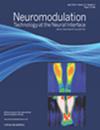The Opinion of Healthcare Professionals About a Proposed European Registry of Neuromodulation for Chronic Pain: An Online Survey
IF 3.2
3区 医学
Q2 CLINICAL NEUROLOGY
引用次数: 0
Abstract
Introduction
During the last decade, the complementary value of real-world data (through registries or medical records) and data from randomized clinical trials has been recognized as increasingly important. In the field of neuromodulation, only a few industry-independent nationwide neuromodulation registries are available. The interest in creating a European registry has increased but without a successful result. The goal of this online survey is to gain further insights into the need for and burden of a European registry for neuromodulation.
Materials and Methods
An online survey was developed and distributed during the 3rd Joint Congress of the International Neuromodulation Society European Chapters in September 2023 (Hamburg, Germany). Healthcare professionals were asked to indicate the need for a European registry, the items that should be collected, and the restrictions to access of a European registry.
Results
In total, 125 respondents opened the link to the survey, of whom 104 completed (at least partly) the survey. Of the 104 responses, 91% indicated that there is a need for a European registry, whereas 6% indicated there is no need. The main reasons for establishing a registry on a European level were the possibility of collecting real-world evidence (84%), the potential to collect big data from European patients (82%), to evaluate safety in neuromodulation (70%), and the possibility of reporting yearly on European activity in neuromodulation (51%). Indications for neuromodulation, patient characteristics, and follow-up assessments were most often stated as items that should be collected. Access should not only be granted to implanters but also to nurses, the assessment team, and other physicians, as agreed on by 64%, 52%, and 51%, respectively.
Discussion
More than 90% of the respondents believed that a European registry for neuromodulation is needed, mainly to obtain real-world (big) data about the effectiveness and safety of this therapy. This survey clearly pointed to the need for a European registry for which it seems key to ensure financial and logistical support, in addition to in-depth legal guidance in developing this registry.
医护人员对欧洲慢性疼痛神经调控注册建议的看法:在线调查。
导言:过去十年间,人们认识到真实世界数据(通过登记册或医疗记录)和随机临床试验数据的互补价值日益重要。在神经调控领域,只有少数几个独立于行业的全国性神经调控登记处。人们对建立欧洲登记处的兴趣与日俱增,但却没有取得成功。本次在线调查的目的是进一步了解欧洲神经调控登记处的需求和负担:在 2023 年 9 月举行的第三届国际神经调控学会欧洲分会联合大会(德国汉堡)期间,我们制作并分发了一份在线调查问卷。调查要求医护人员说明欧洲登记册的必要性、应收集的项目以及访问欧洲登记册的限制条件:共有 125 名受访者打开了调查链接,其中 104 人完成了(至少部分完成)调查。在 104 份答复中,91% 表示有必要建立欧洲登记册,6% 表示没有必要。在欧洲层面建立登记处的主要原因是可以收集真实世界的证据(84%)、可以收集欧洲患者的大数据(82%)、可以评估神经调控的安全性(70%)以及可以每年报告欧洲在神经调控方面的活动(51%)。神经调控的适应症、患者特征和随访评估最常被列为应收集的项目。不仅应向植入者开放,还应向护士、评估小组和其他医生开放,同意这一观点的比例分别为 64%、52% 和 51%:讨论:90% 以上的受访者认为,需要建立欧洲神经调控注册机构,主要是为了获得有关该疗法有效性和安全性的真实世界(大)数据。这项调查清楚地表明了欧洲登记处的必要性,为此,除了在建立登记处时提供深入的法律指导外,确保提供财政和后勤支持似乎也很关键。
本文章由计算机程序翻译,如有差异,请以英文原文为准。
求助全文
约1分钟内获得全文
求助全文
来源期刊

Neuromodulation
医学-临床神经学
CiteScore
6.40
自引率
3.60%
发文量
978
审稿时长
54 days
期刊介绍:
Neuromodulation: Technology at the Neural Interface is the preeminent journal in the area of neuromodulation, providing our readership with the state of the art clinical, translational, and basic science research in the field. For clinicians, engineers, scientists and members of the biotechnology industry alike, Neuromodulation provides timely and rigorously peer-reviewed articles on the technology, science, and clinical application of devices that interface with the nervous system to treat disease and improve function.
 求助内容:
求助内容: 应助结果提醒方式:
应助结果提醒方式:


